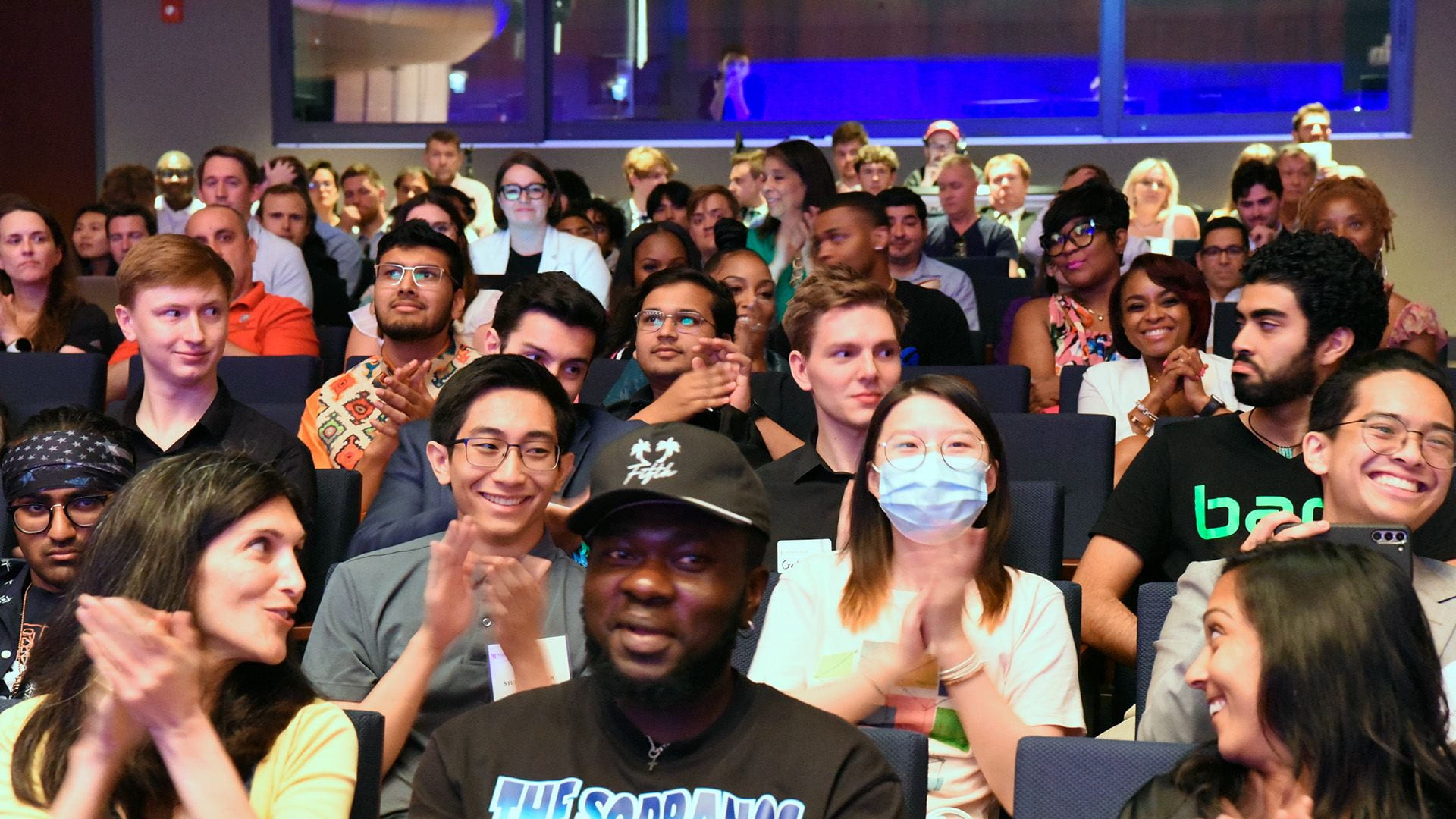
by Meredith Carroll | Nov 14, 2023 | Features
From mentorship to venture funds, learn how the Coleman Entrepreneurship Center has served as a hub of entrepreneurial community in Chicago.
Over the 20-year history of the Coleman Entrepreneurship Center (CEC), one definition of entrepreneurship has risen above the rest.
Entrepreneurship at its best is about meeting a need in your community.
As CEC Executive Director Bruce Leech (MBA ’81) puts it: “I want to honor the student who walks in here and wants to open a grocery store on the South Side of Chicago because there isn’t one — a business that will create jobs and sustain their family.”
It’s a definition of entrepreneurship that reflects what’s distinctive about DePaul University: A commitment to its Catholic, Vincentian mission of making education accessible to all. And promoting peaceful, just and equitable solutions to challenges faced by communities in Chicago and around the world.
The center’s work has garnered recognition. At this year’s Global Consortium of Entrepreneurship Centers conference, which brought together 700 participants from 300 universities across 19 countries, the CEC won the Nasdaq Center of Entrepreneurial Excellence award. The award is the highest honor a university entrepreneurship center can achieve.
And when the Princeton Review released their rankings of university entrepreneurship programs for 2024? The undergraduate program at Driehaus ranked 10th in the nation.
Local solutions to local needs: A look back

Students in the audience for University Pitch Madness, an entrepreneurship competition hosted by CEC that brings together student teams from universities across the Midwest.
The CEC was founded in 2003. Its history stretches back decades before that.
Harold Welsch (BUS ’66, MBA ’68) was the founding chair of the center. Before entrepreneurship was a buzzword, Welsch taught students much like the ones Leech interacts with today: first-generation college students and others who are invested in using business to better their communities.
In the ’90s, Welsch’s focus on empowering small-business owners coincided with rising interest in entrepreneurship.
“Harold was kind of the godfather of entrepreneurship,” Leech says. “The people I look up to now looked up to him. He saw a need” to equip students to “help their family businesses, help their communities.”
Welsch’s work resonated with Mike Hennessy, CEO of the Coleman Foundation from 1995 to 2020 and a champion of entrepreneurship in Chicago. In 2003, with Hennessy’s support and a generous gift from the foundation, the CEC was born.
In 2023, the center’s mission — entrepreneurship as a way of meeting a local need — has proven as relevant as ever. If anything has changed, Leech says, it’s the scope. Students aren’t just bringing an entrepreneurial spirit back to communities in Chicago. From Honduras to India, they’re also making a difference around the world.
A mindset, a skill set, an ecosystem: The CEC’s impact today
A mindset: Cultivating wonder
For Leech, teaching entrepreneurship starts with recognizing that entrepreneurship “isn’t a subject. It’s a skill set.”
It’s also a mindset: a way of engaging with your work regardless of your role.
“One of the best traits you can have as an entrepreneur is a sense of curiosity,” Leech says. “I relate it back to a childlike sense of wonder. At some point, as we get older, we get blinders on. We don’t question anything anymore.”
In teaching entrepreneurship, Leech says, his task is to help students cultivate curiosity.
“Even if you go to work for a big company, don’t just sit there and do your job,” he advises students. “Ask yourself: If this were my place, how would I do it differently?”
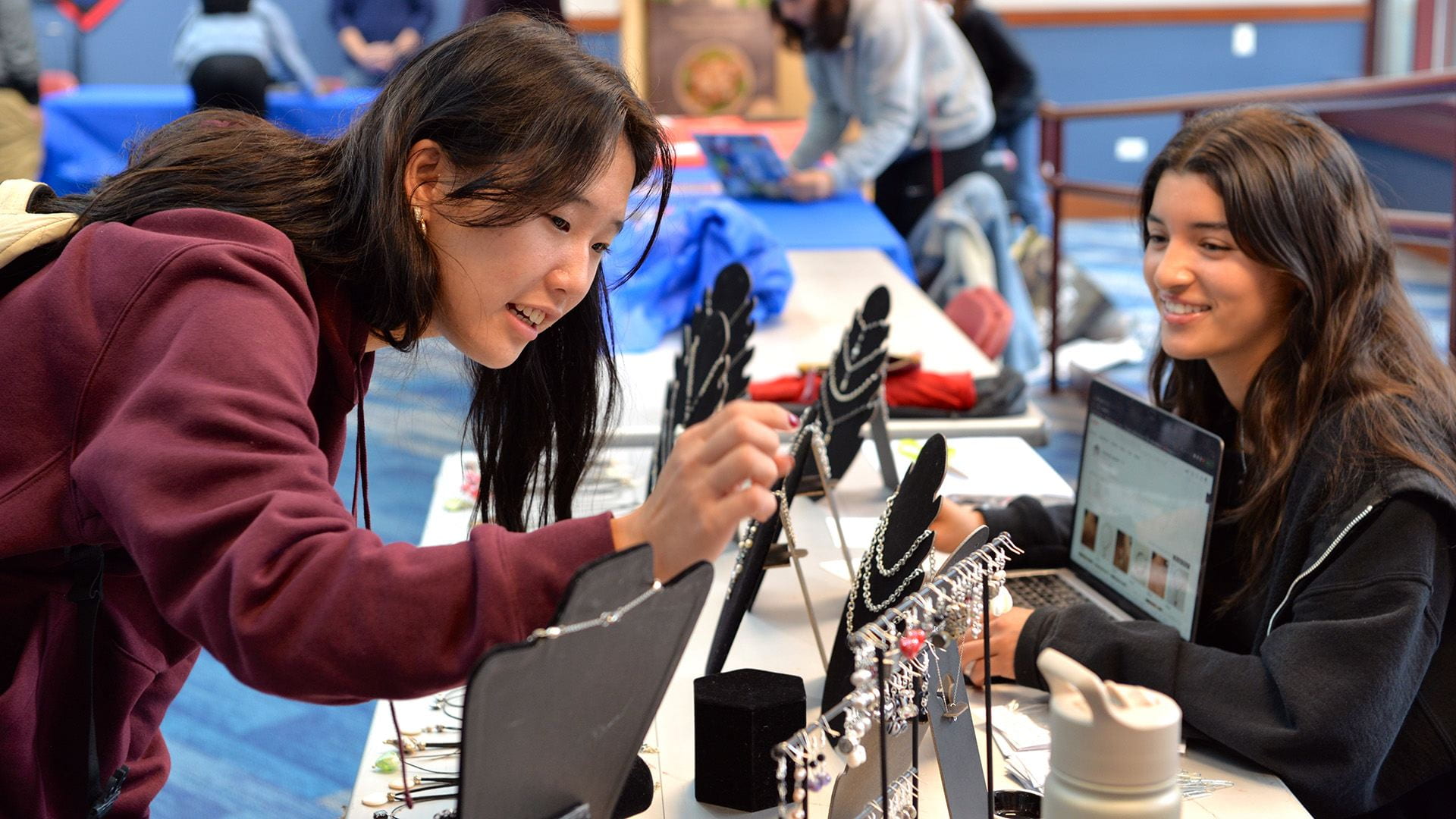
A DePaul student admires jewelry at the Coleman Center’s Welcome Back Market.
A skill set: Internships with an impact
Cultivating an entrepreneurial mindset can benefit all students — not just those who see themselves as entrepreneurs.
Director of Emerging Company Programs Emily Doyle runs the center’s internship program. After the COVID-19 pandemic limited students’ access to work experience, Doyle says, “the need for internships skyrocketed.”
Fast-forward to this year, when the CEC received more than 120 applications for internships. This summer, 36 students participated in paid internships — many funded directly by donors — tailored to their interests and goals. Many of these students came from fields other than entrepreneurship, and many are international students.
Interning in an entrepreneurial environment gives students “unparalleled access to creativity, innovation and problem-solving,” Doyle says.
For many students, an internship is their first exposure to a work environment where there are opportunities to define your role for yourself. It can be daunting and rewarding in equal measure, Doyle says.
Companies benefit too. Interns have taken on significant projects, such as designing logos or launching branding initiatives.
“Students get to make an impact within just a few months,” Doyle says, “in a way that’s not possible at other kinds of companies.”
Put another way, the internship program not only prepares students for the workforce. It also helps students launch their careers while they’re still at DePaul.
An ecosystem: Creating a hub of innovation and connection
Indeed, according to Program Manager Kathia Hernandez (BUS ’22), many students are already engaged in entrepreneurship. They just don’t see it that way.
“Having a side hustle, making art, selling jewelry — all of that is entrepreneurship,” she says. She encourages students to visit the center even if they don’t have specific questions. “Just come in and tell us what you’re doing. We’ll figure it out together.”
This philosophy pervades the center’s work. It applies equally to the center’s role as a hub of entrepreneurial community in Chicago.
The CEC has long supported women in entrepreneurship. The Women in Entrepreneurship Institute — launched in 2018 and now housed in the CEC — supports and empowers women founders through all stages of their entrepreneurial journeys.
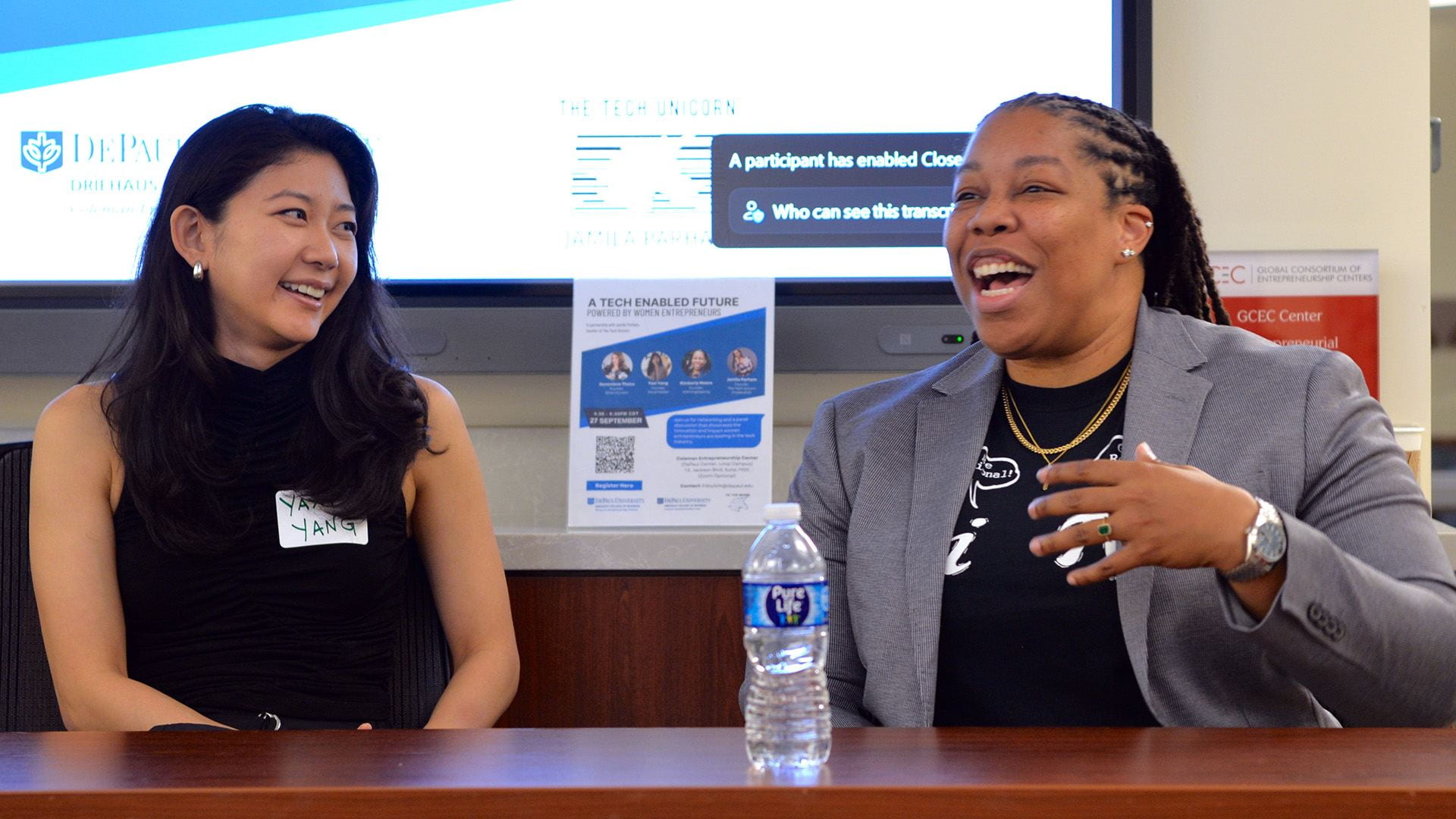
Yaxi Yang and Kimberly Moore speak at A Tech-Enabled Future Powered by Women Entrepreneurs, a panel discussion hosted by the Women in Entrepreneurship Institute in partnership with the Tech Unicorn.
Additionally, the CEC welcomes community members to participate in much of its programming. The Social Impact Incubator takes this community involvement to the next level.
Now entering its third year, the incubator brings together a small cohort of students, alumni and community members — all of them building businesses with a social impact.
For eight weeks, participants get a crash course in how to launch a business. In the process, they create community that can be hard to find elsewhere.
“The common mission of building a business really brings the group together,” says Coleman Chair of Entrepreneurship Maija Renko, who created the program alongside Leech. “You can’t tell who’s a student, who’s a community member. The learning goes in all directions.”
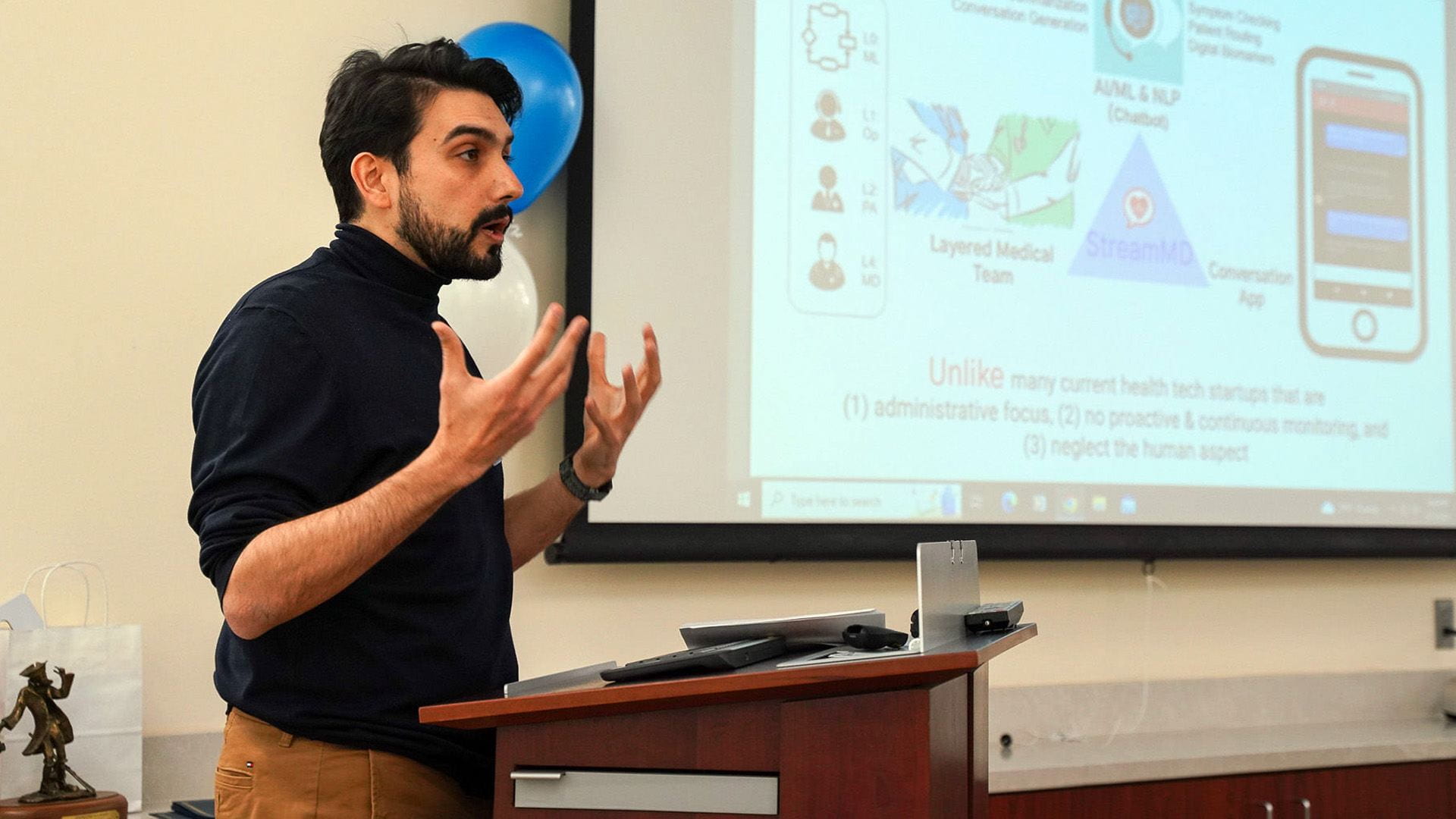
Sina Ansari, assistant professor of management and entrepreneurship at DePaul, pitches his business as a participant in the 2023 Social Impact Incubator.
Many participants of the incubator have gone on to host DePaul student interns. Others have offered up their expertise as mentors. The incubator and other community-focused programs feed into Chicago’s entrepreneurial ecosystem. Students, alumni and local communities all benefit.
Evolving in community: Looking ahead to the future
As the center looks ahead to its next 20 years, entrepreneurship will continue to evolve. The CEC’s role in Chicago’s entrepreneurial ecosystem will continue to evolve along with it.
The newly created Halperin Emerging Company Fund — which provides capital for DePaul to make equity investments in startups founded by DePaul students, alumni and select community entrepreneurs — is one indication of what that evolution might look like.
As an evergreen venture fund launched with a $3 million gift, the Halperin Fund gives students the chance to get firsthand experience with the venture-funding process. Two students sit on the fund’s board. Students participate in early rounds of the vetting process, hearing founders’ pitches and offering feedback.
In this way, education goes hand in hand with giving back.
“Even if it’s a no” on funding, says Doyle, who administers the program, “we can leverage our DePaul network to help businesses continue to grow. We can offer that partnership; we can offer that community.”
It’s a community that will go with students wherever their journey takes them next — from neighborhoods in Chicago to cities around the world.
For Leech, it all comes back to the CEC’s mission.
“Let’s honor and serve the students we’ve got here,” he says. “If I can help them in any way, that’s what I want to do.”
RELATED

by Meredith Carroll | Nov 14, 2023 | Connections, Features
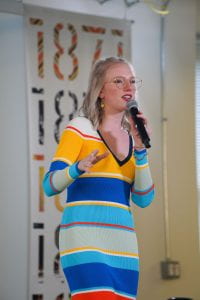
Shuler at the 2023 Purpose Pitch competition
Gretchen Shuler, a junior entrepreneurship student at DePaul, has taken a whirlwind journey from ordinary student to student and entrepreneur. One emotion stands out above the rest.
For Shuler, entrepreneurship is joy.
“Entrepreneurship is enjoying what you do,” she reflects. “Entrepreneurs create companies because they want to do things in a different way. They want to bring their ideas to life and share them with others. That’s such a big part of it.
“Shuler is in the final stages of opening her business: ReBrewed, a fair trade and sustainable mobile coffee cart that will empower foster youth through employment and mentorship. ReBrewed is brewing every cup with a purpose.
The vision for ReBrewed is uniquely Shuler’s own.
As a high school student living in a single-mother household, Shuler relied on her job at a local coffee shop. There, she discovered her passion for coffee and experienced firsthand how flexibility and support at work made it possible to stay engaged in schoolwork and in her community while saving for college.
Supporting foster youth is central to Schuler, whose extended family includes several foster and adopted children. Throughout high school, Shuler also cared for and mentored foster children through an organization that started in Chicago, RePlanted.
The experience gave her an in-depth understanding of the challenges many foster youth face. Many lack access to reliable transportation, making it difficult to participate in extracurriculars, access employment or even attend school regularly. According to the Juvenile Law Center, over 50% of foster youth face incarceration by the age of 17. Children moved to five or more placements are at a 90% risk of being involved in the criminal justice system.
ReBrewed aims to change that.
Shuler envisions a workplace built around the emotional and financial needs of foster youth. Mentorship for employees will be part of that.
“Integrated into the workday, there would be an hour of meeting with your mentor,” she says. “Or you do your homework assignments while you’re at work, rather than when you’re in a home environment that might be chaotic, unsupportive or unsafe.” Shuler’s vision of mentorship is expansive. It’s not only about connecting youth with volunteer mentors, she says; it’s about connecting them to networks of support.
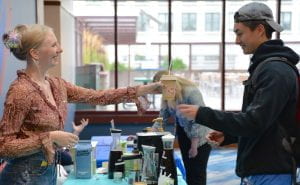
Shuler serves up one of ReBrewed’s first cups of coffee at the CEC’s Welcome Back Market
In this way, Shuler’s vision reflects her experiences at DePaul’s Coleman Entrepreneurship Center (CEC).
“If I had not been mentored throughout this process, I would be so lost,” Shuler says. CEC Program Manager Kathia Hernandez (BUS ’22) guided her through the process of setting up her LLC. The center’s mentorship program connected Shuler with Jazmyn Lopez, a Chicago-area growth strategist specializing in marketing and operational solutions. Lopez was instrumental, Shuler says, in supporting Shuler as she established her online presence and her continuing steps in opening ReBrewed.
CEC’s pitch competitions acted as their own form of mentorship. Shuler competed in, and won, the Student Innovation Expo in February 2023. She placed third in the student category of the Purpose Pitch competition later that spring. Over the summer, she was selected as the DePaul student representative for Pitch Madness. She placed fourth in this competitive, regional competition.
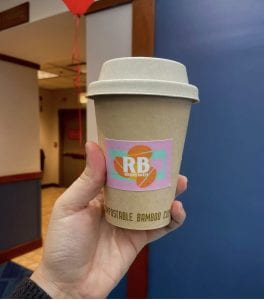
A ReBrewed cup, designed and sustainably produced in collaboration with Sharath Kalappa (CDM ’24)
Feedback from these competitions helped Shuler refine her business model. It got more streamlined. It became more focused on doing good, not only for the foster youth she’ll employ but also for the environment. She collaborated with Sharath Kalappa, founder of EcoPlate and a student in the M.S. in Business Analytics program at the Kellstadt Graduate School of Business, to create cups from sustainable materials. She sourced her coffee from Alma Coffee, a sustainable, farm-to-cup operation founded by Leticia Hutchins (BUS ‘16), whose family has been farming coffee in Honduras for five generations.
When Shuler reflects on her entrepreneurial journey, it’s about dualities: a willingness to ask for help paired with the ability to stand your ground. She has figured out how to delegate even as she found herself taking on role after role: founder, accountant, designer, barista.
“Entrepreneurship,” she reflects, “is that sense of holding your own ground, even when people don’t necessarily believe in you or in what you’re doing. It’s collaboration, independence, innovation, iteration – just a whole mosh pit of self-reflection.
“One last thing I’ll say: It’s about never getting comfortable. Never settling. There’s always something you can do better or affect more people. It’s about being open to change.”

by Meredith Carroll | Sep 25, 2023 | Features, Scholarly Pursuits

Student teams competed to build the tallest spaghetti-and-marshmallow structure — and learn how different kinds of leaders emerge from within teams in the process. [Image by Kathy Hillegonds.]
By Meredith Carroll
What does leadership look like? Not just in general, or for people in positions of power, but for you, right now?
These are the kinds of questions that the inaugural cohort of the William E. Hay Leadership Accelerator will work together to answer. The cohort met for the first time on Friday, September 15, kicking off a year of collaborative workshops, networking opportunities, and other programming designed to empower students to lead with purpose.
To Meghan Anderson, a senior studying digital marketing, the accelerator’s approach to developing leadership skills felt familiar.
“You can be a leader at every level,” said Anderson. It’s a piece of advice an internship supervisor gave her early in her time at DePaul and it’s stuck with her ever since. “Often, that looks like having really good soft skills, or being a really good listener.”
Anderson is part of a select group of forty juniors and seniors from across DePaul. Together, the Hay scholars represent 21 majors – ranging from theatre and animation to finance and marketing. Forty percent of the scholars are first-generation college students. Half of the cohort are students of color.
Over the coming months, students will learn directly from real-world experts and engage in experiential exercises and self-reflection. In this way, the accelerator offers a rare opportunity; these experiences were modeled after the top training programs in companies known for their emphasis on professional development. In recognition of this effort, each student will receive a $2,500 scholarship and a certificate of completion.
Most importantly, the accelerator will equip students to enter the workforce as purposeful leaders. With learning opportunities spanning skill assessments, in-person and live sessions, as well as microlearning, the accelerator leverages multiple tactics to deliver engaging and impactful experiences to boost leadership competencies. Students will also participate in résumé reviews, job interview skills exercises, and networking opportunities – gaining skills that are critical to employability and career building.
In-depth and focused leadership training is rare in companies even at senior levels, according to Professor and William E. Hay Leadership Fellow Erich Dierdorff. Dierdorff leads the program along with Associate Dean of Graduate and Executive Education Robert S. Rubin and Associate Director of Operations Clarissa Short.
“To have something like this at the undergraduate level is exceptionally rare and represents such a unique opportunity for our students to get significant boosts in the competencies that we know underlie long-term professional success,” Dierdorff said.
These skills are only becoming more crucial in a workplace environment that is rapidly changing. A recent study by Business Name Generator surveyed 1,000 employees and employers across the U.S. to uncover the changing demand for soft skills in the workplace. Findings indicated that 84% of employees and managers believe new employees must demonstrate soft skills upon entering the organization. Foremost among these? Leadership, which was the skill rated most valuable for career advancement.
For many Hay scholars, like Meghan Anderson, it was precisely the chance to develop these soft skills – and to develop them in collaboration with others – that drew them to the accelerator.
“When you’re a college student, you get so focused in on your major. This is an opportunity to meet new people and broaden your horizons,” said Harper McCoy, a senior majoring in film and television who hopes to become a film director.
Andrew Gomes, a junior studying finance, cited his experience launching an investment club in high school as the beginning of his leadership journey.
“I want to contribute value to the next generation,” he said of his career goals. “Maybe one day I’ll be able to help a student like me.”
And in this emphasis on people and purpose, the accelerator is part of a broader legacy left by William E. Hay (MBA ’66, DHL ’06), a longtime trustee and benefactor of DePaul.
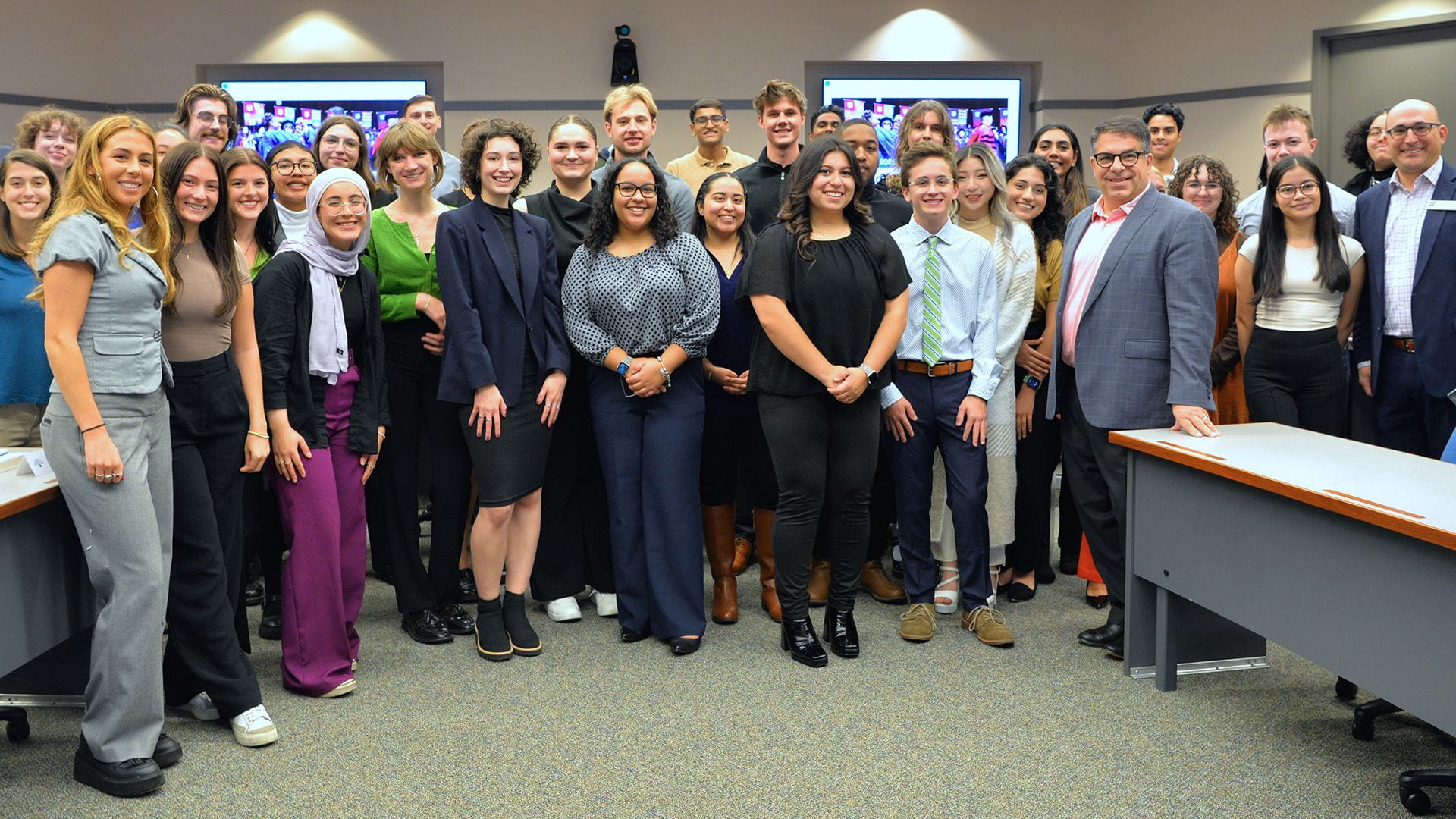
The inaugural cohort pictured with President Robert L. Manuel. [Image by Kathy Hillegonds.]
A substantial gift from Hay’s estate funded the founding of the Hay Center for Leadership Development, which houses programs in executive education along with the leadership accelerator.
“You can study management and business” at any number of schools, Manuel concluded. “But to couple that with the human, organic nature of the world — that’s a special gift.”
The William E. Hay Leadership Accelerator is a comprehensive, co-curricular leadership development experience open to juniors and seniors from across DePaul. Students can learn more and apply here.
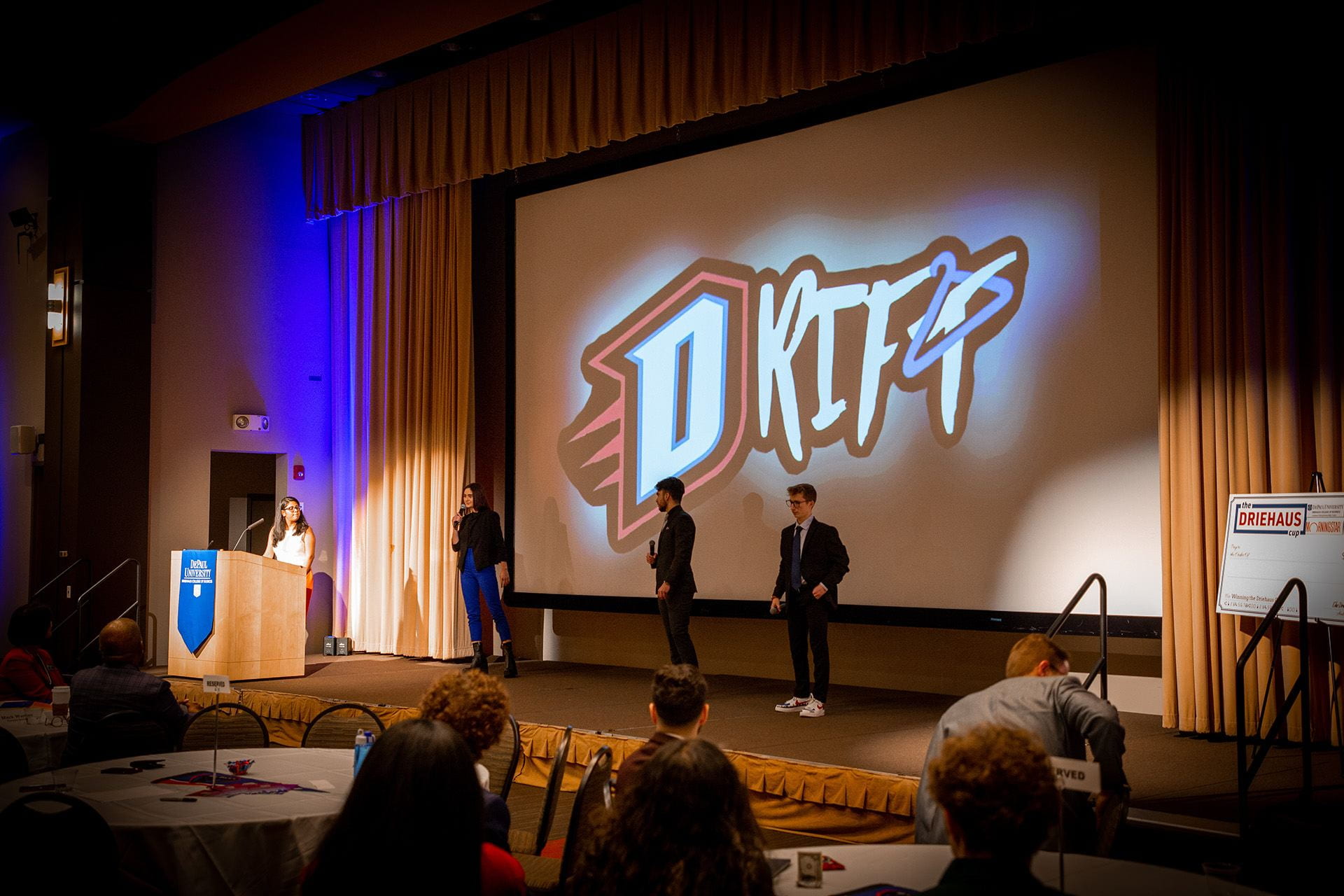
by Kate Silver | May 18, 2023 | Features
DePaul’s refreshed bachelor’s in business curriculum is energizing and engaging career-minded students
![Pictured from the Drift Team (L to R): Shivani Patel (at podium), Suzanna Linek, Omar Hatamleh, Ethan Brock. [The fifth member, Arshdeep Singh, is not pictured.]](https://blogs.depaul.edu/business-exchange/files/2023/05/dreheuis_cup_driiffs.jpg)
Business students (L to R): Shivani Patel (at podium), Suzanna Linek, Omar Hatamleh and Ethan Brock pitch their business idea, a resale shop called Drift for DePaul students, at the Driehaus Cup Competition. [The fifth team member, Arshdeep Singh, is not pictured.]
This spring, a temporary thrift store will pop up on DePaul’s Lincoln Park campus. Called Drift, the store will be filled with clothing and accessories donated by students, for students, in an effort to support pocketbook-friendly, repurposed fashion.
Fittingly, students designed and pitched the thrift concept last fall at the Driehaus Cup, a new business competition within the Driehaus College of Business. Business major Ethan Brock says he never imagined he’d be planning and running a business, especially during his first year of college.
“Everybody has ideas. But making it come to life is a different thing,” he says. “So this project has definitely forced me to change the way I look at things.”
In fact, that understanding of business principles isn’t just the goal of the Driehaus Cup, which caps off the new course, BUS 101: Introduction to Driehaus, Fundamentals of Business & Entrepreneurial Thinking; it’s the focus of the redesigned core curriculum of the Driehaus College of Business’s Bachelor of Science in Business (BSB) program.
The new core is the culmination of years of planning and discussions that started in 2019, when the college’s undergraduate curriculum committee first came together to imagine the ideal education for the modern business major.
Management Professor Jaclyn Jensen, a member of that committee who is now associate dean of student success, says the updated curriculum, which includes four new interdisciplinary courses, is designed to offer students more opportunities for community, connection and career-readiness.
“It was time to update the core to make sure that we were delivering a modern and refreshed experience to our students that aligned with what employers are seeking today,” says Jensen. “And also to get them connected to their experience as a business student sooner than they have had in the past.”
The New Core
From the moment they set foot on campus, students now get a deeper understanding of what business is and whom it serves, says Associate Professor of Marketing James Mourey, who is faculty coordinator of BUS 101 and also served on the curriculum committee. “Business is about uncovering human needs that are unfulfilled and finding ways to create products, services or experiences that fulfill those needs,” he says. “So at the end of the day, it’s fundamentally human.”
Starting with BUS 101: Introduction to Driehaus, Fundamentals of Business & Entrepreneurial Thinking, all first-year and transfer students learn about core business fundamentals and glean a better understanding of disciplines such as accounting, economics, finance, hospitality, marketing and management. The second half of BUS 101 teaches students about the entrepreneurial mindset — something Driehaus College of Business is known for.
That’s where the Driehaus Cup comes in. In groups, classmates develop business ideas and compete in the signature pitch competition, which is sponsored by Morningstar, the Coleman Entrepreneurship Center at DePaul and Protiviti. Finalists from each section advance to take the stage of the Lincoln Park Campus Student Center and pitch their idea before a panel of judges and an audience of around 300, competing for scholarship prizes and bragging rights for the Driehaus Cup trophy.
“In any given quarter, there are over 50 new business ideas that are coming out of the course,” says Jensen. Past ideas have included a water bottle that monitors intake, a continuous glucose monitor that doesn’t make disruptive alarms and a food delivery service that brings orders to specific seats at a sports or event venue. “It tells students the value of being in a place where the learn-by-doing philosophy is true through and through,” she says.
BUS 101 also aims to help students make the most of DePaul. Every week, students watch a video called “The Driehaus Difference” that highlights services and supports on campus, such as where to go to get help with writing, how to learn more about study abroad and how to go about getting an internship. In fact, Mourey, who has taught at DePaul for nearly 10 years, says he’s seeing students think seriously about internship and career opportunities earlier than ever.
“What I see now is my first-year students are landing internships or have their resume and their LinkedIn page polished and ready to go,” he says. “That’s game changing for career trajectory.”
Three other classes also make up the new core curriculum:
- BUS 102: Business Analytics gives students the tools to understand evidence-based decision making, says Jensen, and it’s something that is top-of-mind for employers these days.
- BUS 103: Business for Social Good explores how enterprises can help people and the planet, while also making a profit. “The course is oriented around big, sticky problems that organizations face today and how the different business disciplines can help address those exact problems,” says Jensen. “It’s also aligned with our mission at DePaul around doing good and doing well.”
- BUS 202: Business Technology teaches students about the latest technologies that successful businesses use, such as artificial intelligence and blockchain, and prepares students to adapt to future innovations.
Looking ahead
It’s the first year for the core curriculum revamp, but so far, it’s receiving rave reviews. Jensen says that student evaluations have been extremely positive. Anecdotally, Mourey says he’s hearing students talk excitedly about signing up for study abroad trips and joining networking groups, such as the professional business fraternity Delta Sigma Pi.
Business major Suzanna Linek, a junior transfer student who recently completed BUS 101, is one of those students. She joined Delta Sigma Pi after learning about it in class and feels energized by the possibilities. “The opportunities are endless and a great stepping stone to so many connections and great experiences,” says Linek.
One of those opportunities is Drift, which Linek is working on with Brock. After the two students and their teammates presented the concept in the Driehaus Cup, judges and students told them they loved the idea. So they decided to pursue it. They secured funding from the Coleman Entrepreneurship Center and began collecting donations for a series of pop-up events around campus before the school year ends.
In time, Brock says the team hopes to open a physical store on campus and employ student workers. It’s been laborious, but Brock says he’s learned a lot about himself and what’s possible. “It’s a lot of work right now, but as it comes to life it feels more and more rewarding and just goes to show the number of things that I can accomplish thanks to the resources and programs provided for undergrad students in DePaul’s business programs.”

by jlansber | Nov 13, 2022 | Features
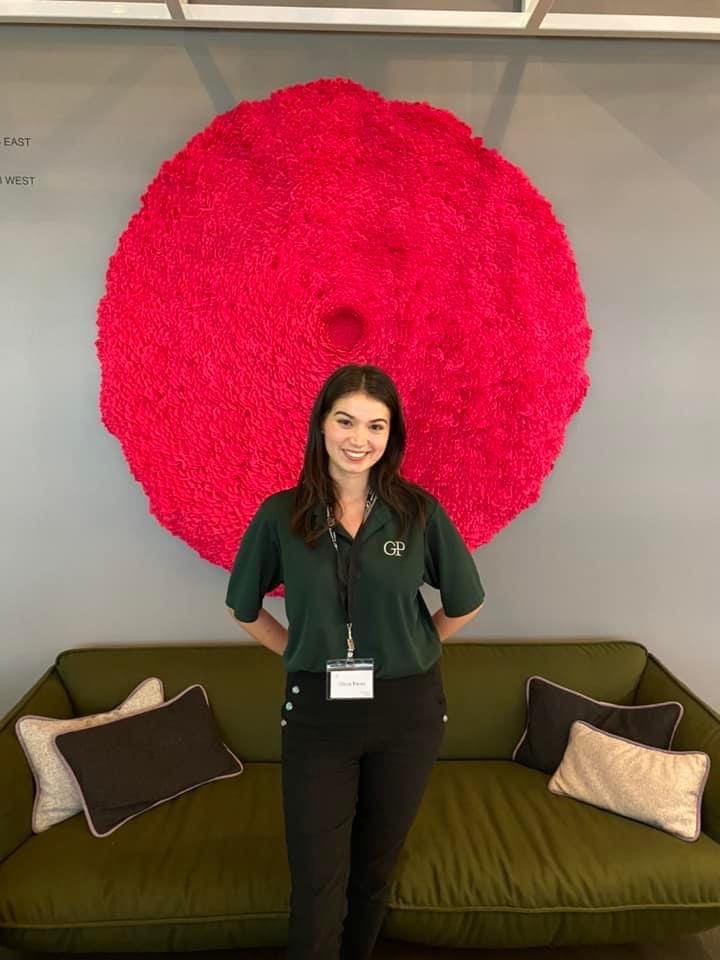
DePaul business major Olivia Perez
DePaul business major Olivia Perez only started college in September, but she already has a solid base of knowledge about the finance industry, thanks to her participation in summer finance programs hosted by the nonprofit Greenwood Project and DePaul.
Two summers ago, a guidance counselor at her high school, De La Salle Institute on the Chicago’s South Side, suggested that Perez enroll in the Greenwood Project’s Summer High School FinTech Institute. The program teaches computer coding, financial literacy and career skills to students of color. “I was initially planning to major in technology, specifically computer science, but I also had an interest in finance,” Perez says. She didn’t seriously consider finance as a career path, however, because she knew little about it and didn’t know anyone working in this field.
Her involvement in the Greenwood Project changed that. “I found the bridge that connected technology and finance,” she says. “It was a whole new world for me. I didn’t have anyone in my family in finance. So, it was nice be able to connect with other people who, like me, were interested in finance.”
After graduating high school last spring, Perez applied to the Driehaus College of Business and enrolled in a second Greenwood Project summer program, this time a 10-week finance boot camp at DePaul’s business college. Taught by DePaul finance professors, alumni and industry leaders, the program covered the fundamentals of finance and investing, as well as skills for communicating and presenting yourself effectively in a business setting.
Perez appreciated the program’s holistic approach and found a presentation by DePaul finance instructor Joe Silich (BUS ’92), head of The Silich Group at Morgan Stanley, particularly meaningful. “He mentioned that in order to be successful, you have to immerse yourself in the culture of finance professionals. You have to dress the part, and you have to come in with the right mindset.”
Perez says the program made her more confident about her decision to come to DePaul this fall and major in finance. “The professors gave us a glimpse of the curriculum at DePaul and were really approachable,” she says. “They made the subject easy for us to comprehend and made us feel comfortable to ask questions.” Perez plans to enroll in the Greenwood Project-DePaul program for college students next summer, which includes summer internships with financial service firms.
Creating more opportunities for underrepresented students to enter finance benefits both students and the industry, Perez observes.
“I feel that diversity is incredibly important,” she says. “The more diversity of thought and voices that an industry allows, the more creativity there is. For example, my being Hispanic and a woman—those are both groups that are not really well-represented in finance. And so I want to be a voice and to inspire others as well.”
By Robin Florzak

by jlansber | Nov 13, 2022 | Features
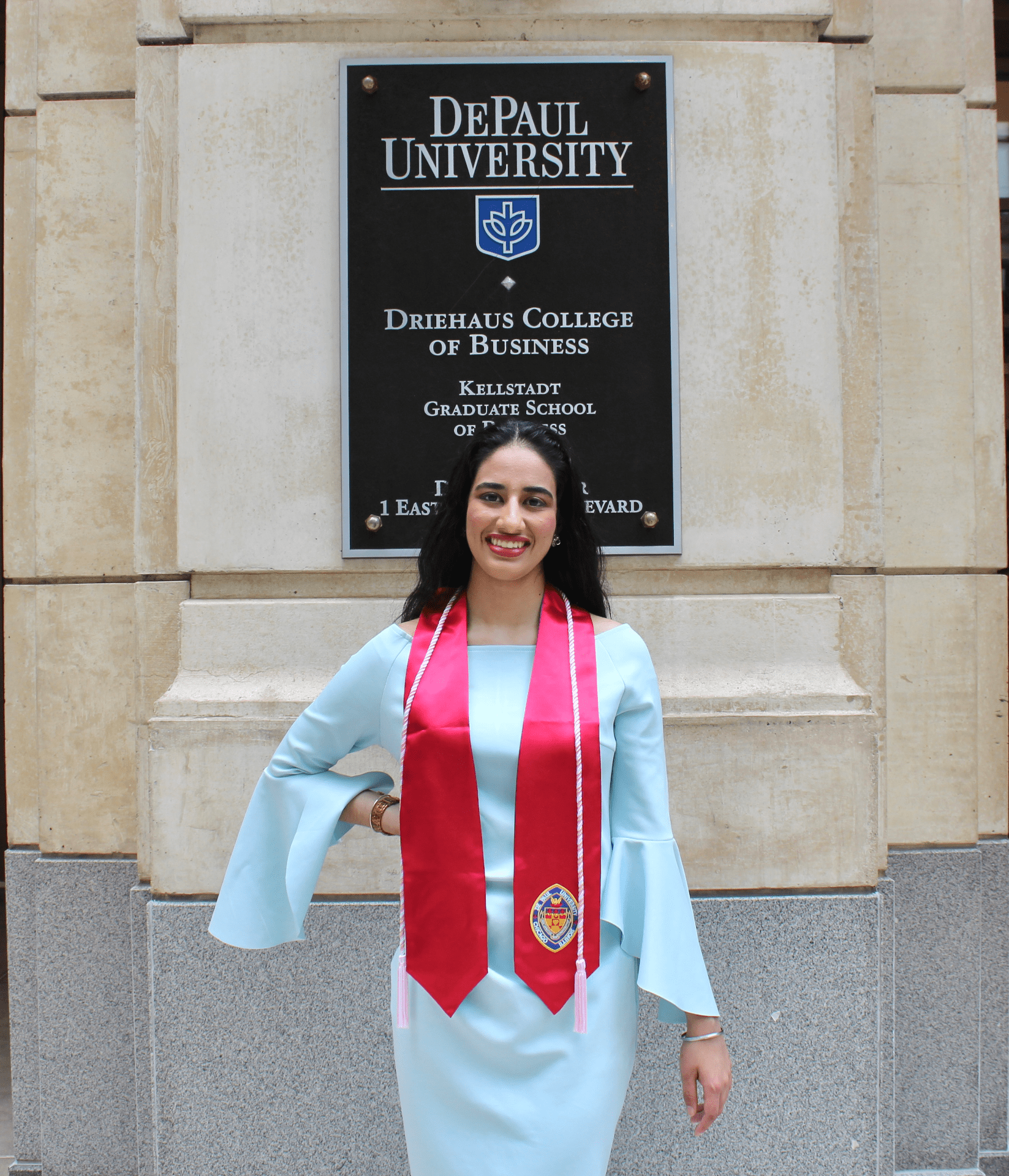
Seerat Kaler (BUS ’21)
Seerat Kaler (BUS ’21) is the daughter of immigrants who came to the United States from Punjab, an agricultural region in India, seeking to raise their children in a place that they believed would offer more opportunities for success. For Kaler, those opportunities came to fruition at the Driehaus College of Business, where she found people and programs committed to empowering her success.
Kaler entered DePaul with an interest in economics, but she didn’t quite know which career path to pursue. That changed when she attended DePaul’s annual career fair during her sophomore year and met representatives from CIBC U.S., including the head of the multinational bank’s financial institutions group. Before she knew it, Kaler and the executive had spoken for more than 40 minutes. She recalls sharing her passions, interests and motivations in life, and “he was gracious enough to look at my résumé and provide honest comments. It was an experience unlike any other career fair visit.”
Later on, Kaler successfully landed multiple internships at CIBC and interacted with stellar mentors along the way. “My internships at CIBC were my first exposure to commercial banking, and I really enjoyed it,” she says. “The hands-on experience taught me about various industries and their business models. The clients we serve taught me substantially about building wealth in America—specifically in business industries that are unexplored by my community.”
During her junior year she was accepted into the Keeley Center Academy, a selective, rigorous, two-year DePaul career-readiness program that provides students with the skills and contacts to become successful in finance. “It was a really intense experience, but what it did was it bridged the gap for people, like me, who have this great ambition to do something, but don’t really understand how this industry actually works. It taught me the ropes and made meeting industry professionals easy.”
Kaler and the seven other women students in her Keeley Center Academy cohort formed a tight-knit group to support each other as they pursued their studies and future careers in a field where men greatly outnumber women. The group began discussing how they could expand this support network to other women and business students from diverse backgrounds. This led Kaler and her classmates to found Females in Finance, a DePaul student organization dedicated to promoting allyship and leadership empowerment for women in finance.
“We launched in fall quarter (2020) and quickly went from eight to 64 members,” Kaler says. The organization also attracted strong industry collaboration, amassing a sizable endowment and support from companies that include Morgan Stanley, BMO Harris Bank and William Blair. The effort helped Kaler earn the Keeley Academy’s 2021 Most Inspirational Student Award.
After graduating with a bachelor’s in finance, Kaler joined CIBC full time as a commercial banking associate and, this past summer, was placed in the Loan Syndications group.
One of the key values Kaler holds as a follower of the Sikh religion is Vand Chhako, which means to share what you have and consume it as a community. Kaler embraces this value as a member of CIBC’s DePaul Campus Champion college recruiting team. Through her continuing contact with DePaul’s Females in Finance, she has helped recruit four female students for internships and full-time roles at CIBC in the past two years.
“This is the kind of progress I am trying to make,” Kaler says. “My main goal is to help as many people as possible. I don’t think there’s anything to gain from competing with people. That’s how I interact with people, and I’m hoping to keep that going for the rest of my career.”
By Robin Florzak

















